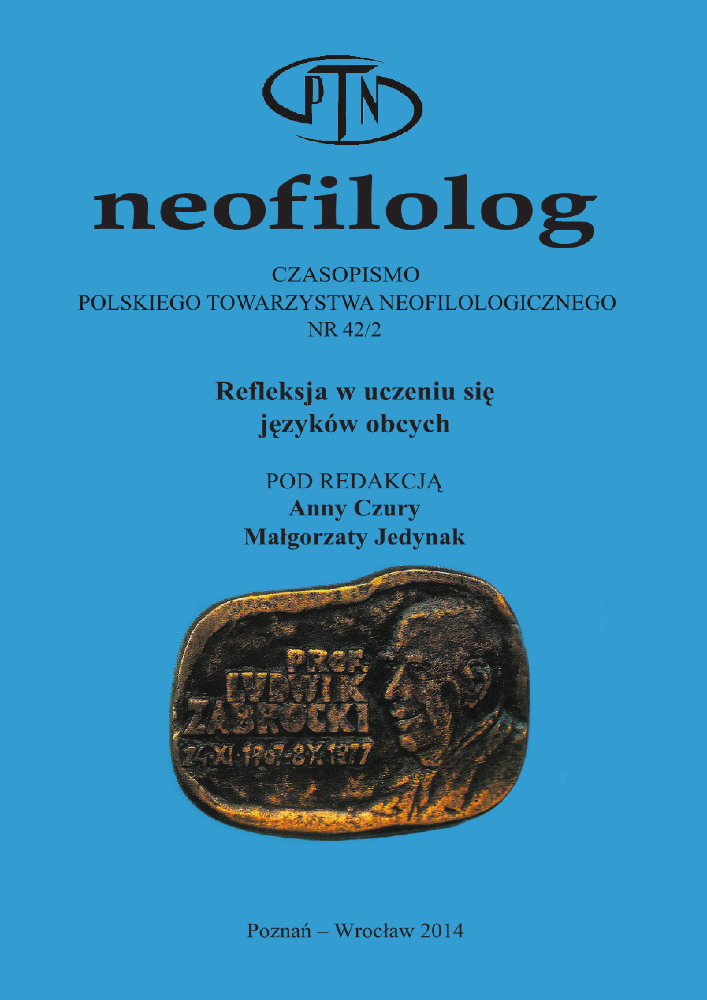Abstract
This article examines various levels of reflection in language learning and teaching, such as reflecting on one’s own foreign language production, on the language system in general, on one’s learning habits and, in the case of the teacher, on the teaching process. The author hypothesizes that all of these are bound to change some of their characteristics depending on features such as age of the learner and learning context. The article examines reflection in adult students of commercial language courses, trying to point out that all the levels of reflection mentioned are supposed to increase in this group. Age is proved to increase language-focused reflectivity in the subjects, whereas the specific learning context might, for reasons of strong personal motivation, be an asset in encouraging learner reflections on their own learning strategies. These conclusions are nonetheless to be treated with caution, for some specific inhibitors to reflection might appear in this group as well, and further research is needed to confirm this possibility.References
Berthoud, A. C. 1982. „La relative fiabilité du discours métalinguistique des apprenants”. Encrages, Enseignement, Recherche: théories et pratiques 8/9: 139-142.
Bouchard, R., de Nuchèze, V. 1987. „Formulations métalangagières et situations exolingues” (w:) S’approprier une langue étrangère (red. H. Blanc, M. Le Douaron, D. Véronique), Paryż: Didier Erudition: 55-62.
Choy S. Ch., Oo P. S. 2012. „Reflective thinking and teaching practices: A precursor for incorporating critical thinking into the classroom?”. International Jour-nal of Instruction 5(1): 167-182.
Culioli, A. 1968. „La formalisation en linguistique”. Cahiers pour l’analyse 9: 106-117.
Dassier, J.-L. P. 2001. „Rôles de la communication et de la grammaire pour les novices du français langue étrangère”. The French Review 74(4): 686-697.
Holster, J. 1986. Student Autonomy in Adult Classes, Manchester Monographs 05/86.
Huot D., Schmidt R. 1996, „Conscience et activité métalinguistique. Quelques points de rencontre”. Acquisition et interaction en langue étrangère 8. http://aile.revues.org/1237 DW 24.07.2013.
Kierczak A. W., Sitko A. 2004. „Autonomia ucznia a nauczanie języka specjalistycznego, czyli czy wprowadzać autonomię na lektoratach?” (w:) Autonomia w nauce języka obcego (red. M. Pawlak), Poznań-Kalisz: UAM: 149-159.
Krashen, S. D. 1982. Principles and Practice in Second Language Acquisition. Oxford: Pergamon Press.
Michońska-Stadnik, A. 2013. Teoretyczne i praktyczne podstawy weryfikacji wybranych teorii subiektywnych w kształceniu nauczycieli języków obcych. Wrocław: Wydawnictwo Uniwersytetu Wrocławskiego.
Minott, M. A. 2011. „The impact of a course in reflective teaching on student teachers at a local university college”. Canadian Journal of Education 34(2): 131-147. http://ojs.vre.upei.ca/index.php/cje-rce/article/view/530 DW 24.07.2013.
Myczko, K. 2004. „Kognitywna teoria uczenia się i rozwijanie autonomii ucznia w dydaktyce języków obcych” (w:) Autonomia w nauce języka obcego (red. M. Pawlak), Poznań-Kalisz: UAM: 19-30.
Silcock, P. 1994. „The Process of Reflective Teaching”. British Journal of Educational Studies 42(3): 273-285. http://www.jstor.org/stable/3121886 DW 15.07.2013.
Tokarski, J. (red.) 1980. Słownik wyrazów obcych. Warszawa: PWN.
Trevise, A. 1996 „Réflexion, réflexivité et acquisition des langues”. Acquisition et interaction en langue étrangère 8, http://aile.revues.org/1223 DW 05.06.2013.
Turula, A. 2004. „Czy warto siać? – autonomia na kursach językowych dla dorosłych” (w:) Autonomia w nauce języka obcego (red. M. Pawlak), Poznań-Kalisz: UAM: 285-289.
Vasseur, M.-T., Arditty, J. 1996. „Les activités réflexives en situation de communication exolingue: réflexions sur quinze ans de recherche”. Acquisition et interaction en langue étrangère 8, http://aile.revues.org/1245 DW 24.07.2013.
License
Copyright (c) 2019 Neofilolog

This work is licensed under a Creative Commons Attribution-NoDerivatives 4.0 International License.
Authors
Authors of texts accepted for publication in Neofilolog are required to complete, sign and return to the Editorial team’s office the Agreement for granting a royalty-free license to works with a commitment to grant a CC sub-license.
Under the agreement, the authors of the texts published in Neofilolog grant Adam Mickiewicz University in Poznań a non-exclusive, royalty-free license and authorize the use of Attribution-NoDerivatives 4.0 International (CC BY-ND 4.0) Creative Commons sub-license.
The authors retain the right to the free disposal of the work.
Users
Interested Internet users are entitled to use works that have been published in Neofilolog since 2017, under the following conditions:
▪ attribution – obligation to provide, together with the distributed work, information about the authorship, title, source (link to the original work, DOI) and the license itself.
▪ no derivatives – the work must be preserved in its original form. Without the author's consent, it is not possible to distribute the modified work in the form of translations, publications, etc.
Copyrights are reserved for all texts published since 2017.
Miscellaneous
Adam Mickiewicz University in Poznań retains the property right as a whole (layout, graphic form, title, cover design, logo etc.).
